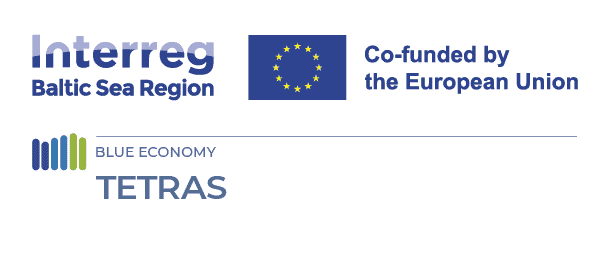
Meet our Partners: University of Gdańsk
31 July 2024
Ten partners from five different countries collaborate in the TETRAS project with the common goal of improving the economic and environmental sustainability of Recirculating Aquaculture Systems (RAS) in the Baltic Sea Region. TETRAS mission? To develop tools and standards to assess and monitor RAS and promote investment, implementation, and expansion of these production systems.
Today, let’s delve into the insights of University of Gdańsk.
Company/Organisation: University of Gdańsk
Country: Poland
Interviewee(s): Hanna Łądkowska and Basia Dmochowska
Website: https://en.oig.ug.edu.pl
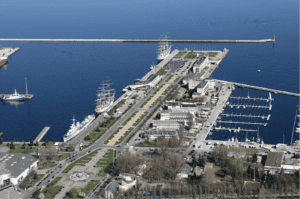
Port of Gdynia, Poland.
At the heart of Northern Poland, the University of Gdańsk stands as a beacon of modern academic excellence and innovation. As one of the country’s most advanced academic centers, UG is a proud member of the Sea-EU network, boasting a strong research and education profile, particularly within its esteemed Faculty of Oceanography and Geography. The faculty is renowned for its cutting-edge research and teaching infrastructure, which spans across the Gdynia Campus, Baltic Campus, and includes field stations like the Marine Station in Hel and the Centre for Monitoring and Water Protection Borucino at Lake Raduńskie.
The faculty counts with a research vessel, a 50-meter catamaran ‘OCEANOGRAF’, which symbolizes their commitment to interdisciplinary studies of the Baltic environment, providing invaluable hands-on education for students. The faculty’s research initiatives are expansive, covering coastal waters and ecosystems, pollution levels, human impact on coastal ecosystems, and the development of new research methods and ecohydrodynamic models. Their work significantly contributes to the sustainable exploration of marine resources and evaluates the socioeconomic significance of marine ecosystems.
Aquaculture in Focus
Faculty of Oceanography and Geography has several focuses, one of which is aquaculture, a rapidly growing field with immense potential for sustainable food production. The faculty promotes innovative and sustainable aquaculture practices, hosting facilities that drive forward the blue biotech sector. They offer an undergraduate study program in Aquaculture, Business, and Technology, and maintain an extensive network of collaborations with SMEs, research institutions, and sectorial organizations. Their work in recirculating aquaculture systems (RAS) is particularly notable, addressing key challenges such as high investment and operational costs through innovative research and pilot projects.
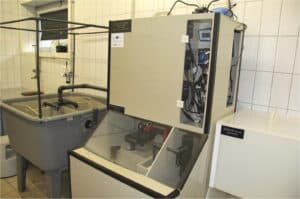
RAS500 set-up the University of Gdańsk, Poland
The University of Gdańsk’s involvement in numerous EU-funded projects, including TETRAS, showcases their commitment to advancing aquaculture technologies and sustainable practices. Through TETRAS, they leverage their expertise in life cycle assessment to evaluate the environment and energy efficiency of RAS systems. By participating in projects like these, UG aims to align economic development with social and environmental goals, contributing to the broader mission of sustainable aquaculture in Poland and the Baltic Sea region.
In the Spotlight
The Faculty of Oceanography and Geography at the University of Gdańsk has participated in numerous scientific and cross-border projects, including EU FP5, FP6, FP7, BONUS, INTERREG (FOCUS, BALSAM, COMPLETE, SEAPLANSPACE, INNOAQUATECH, BluePlatform, AQUAVIP, TETRAS, AquaLoop) and EMFAF (BlueBioTechpreneurs). The faculty hosts a network of practitioners, NGOs, SMEs, authorities, and young professionals, providing professional training, study visits, summer schools, conferences, webinars, and sectoral information.
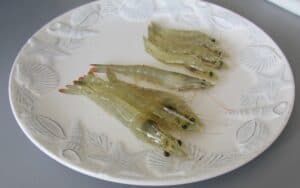
shrimps cultivated in the RAS500 set-up the University of Gdańsk, Poland
University of Gdańsk as part of the TETRAS project
What was your motivation to join TETRAS?
Our previous experience with recirculating aquaculture systems (RAS) has shown them to be very promising food production systems, contributing to both sustainable water management and the transition to a circular economy. However, these systems still require demonstration due to high investment and operational costs. The TETRAS project proposes research and linking RAS to industrial processes to increase efficiency while producing high-quality food economically. We are also looking for improvements through the application of life cycle assessment (LCA) to the project’s pilot RAS systems. Additionally, we were also motivated to work with the consortium that shares the same regional challenge of harmonizing economic development with social and environmental goals.
Can you describe your involvement in the project? What are your primary objectives within the project?
The University of Gdańsk (UG) participates in most of the activities of the TETRAS project. The main tasks of UG involve conducting Life Cycle Assessment (LCA) in cooperation with experts from the University of Milan to assess the environmental and energy efficiency of systems for breeding aquatic organisms. These assessments are being conducted in two of the four project pilots: Pilot 2 in Lithuania, led by the University of Klaipėda, which works with geothermal resources and RAS, and Pilot 4 in Denmark, led by Guldborgsund Municipality, which consists of a small-scale RAS aimed at raising aquaculture awareness.
What specific expertise or unique perspective does the University of Gdańsk brings to TETRAS?
The University of Gdańsk brings specific expertise and perspectives to TETRAS, including research excellence with a strong focus on marine and environmental sciences. This is critical for TETRAS, as it involves understanding the biological and chemical processes and environmental impacts of aquaculture systems. UG’s interdisciplinary approach, which includes knowledge from various scientific fields, is vital for TETRAS as it aims to integrate different aspects of aquaculture, technology, economy, and policy. Additionally, UG’s regional knowledge and networks are crucial for addressing specific regional challenges within the TETRAS project. This provides an ideal platform for the faculty and the university to collaborate with other institutions, sharing knowledge and expertise across different disciplines.
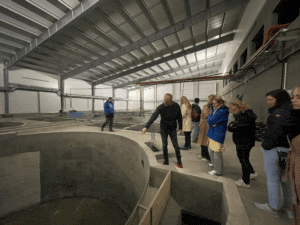
TETRAS consortium visiting K1/K2 trout farm, a new RAS investment in Poland.
What do you consider the main challenges related to RAS implementation in Poland? And in the Baltic Sea Region?
As indicated by partners from the region, the main challenges related to the implementation of recirculating aquaculture systems (RAS) generally include economic factors (high initial investments and operational costs), regulatory and policy issues, and market acceptance issues, which in the case of Poland, relate to the entire aquaculture sector. According to experts cooperating with the University of Gdańsk in recent projects, aquaculture technology is certainly one of the elements that enable the development of the sector in the Baltic Sea region and should not be considered an obstacle (Baltic countries experts’ recommendations, BLUEPLATFORM, INTERREG BSR, 17.11.2020).
How do you see the RAS sector in Poland and the Baltic Sea Region in the next 5 to 10 years?
Poland and the Baltic Sea region have regional specificity. The current state of fish stocks in the Baltic Sea is cause for concern, so any governmental action in favor of aquaculture would be desirable, including fish stock restoration, environmental protection, food security and job guarantee. To combat climate change impacts, strengthen food security and to ensure that people can remain in the fishing profession, the government aims to further develop aquaculture, including in areas harboring offshore wind farms and inland regions. As pointed out by the Director of the Department of Fisheries, Polish Ministry of Agriculture and Rural Development. It is also crucial for the scientific community to outline, considering the socio-economic aspect, a direction that allows for the recovery of stocks and the continuation of marine fisheries. In the next EU institutional cycle (2024-2029), the government will focus on activities that contribute to increasing the production potential of sustainable fisheries and aquaculture. Policy decisions will be based on environmental, social, and economic data collected from fishermen and aquaculture farmers. Therefore, here there is a chance for the recirculating aquaculture systems. Still, in the field of aquaculture, it is also planned to support operations aimed at modernizing and upgrading infrastructure and improving the energy efficiency of fish farms. In addition, funding is provided for operations that support innovation and technological development or projects related to the application of recirculating aquaculture systems (RAS) and decarbonization (1).
What outcomes or impacts do you hope to achieve through the project?
We hope that the project results will indicate beneficial applications of RAS systems, which will translate into decisions regarding policy and financing of these solutions in the Baltic Sea region. At the same time, we hope to raise public awareness of aquaculture in general, and land-based systems, focused on limited water usage and safe for the environment, in particular. We would especially like to further apply LCA results performed on two project pilot RAS facilities to further improve RAS system performance, to minimize environmental impact of the systems.
Stay tuned for more information about the project and its partners!
References:
(1) Eurofish (2024). Poland: Adapting to and mitigating climate change impacts calls for new approaches. Eurofish. URL: https://eurofish.dk/poland-adapting-to-and-mitigating-climate-change-impacts-calls-for-new-approaches





